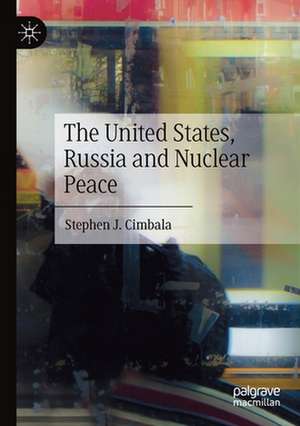The United States, Russia and Nuclear Peace
Autor Stephen J. Cimbalaen Limba Engleză Paperback – 4 feb 2021
| Toate formatele și edițiile | Preț | Express |
|---|---|---|
| Paperback (1) | 641.71 lei 43-57 zile | |
| Springer International Publishing – 4 feb 2021 | 641.71 lei 43-57 zile | |
| Hardback (1) | 642.94 lei 43-57 zile | |
| Springer International Publishing – 4 feb 2020 | 642.94 lei 43-57 zile |
Preț: 641.71 lei
Preț vechi: 754.95 lei
-15% Nou
Puncte Express: 963
Preț estimativ în valută:
122.80€ • 127.43$ • 102.64£
122.80€ • 127.43$ • 102.64£
Carte tipărită la comandă
Livrare economică 17-31 martie
Preluare comenzi: 021 569.72.76
Specificații
ISBN-13: 9783030380908
ISBN-10: 3030380904
Pagini: 254
Ilustrații: XX, 254 p. 23 illus.
Dimensiuni: 148 x 210 mm
Greutate: 0.45 kg
Ediția:1st ed. 2020
Editura: Springer International Publishing
Colecția Palgrave Macmillan
Locul publicării:Cham, Switzerland
ISBN-10: 3030380904
Pagini: 254
Ilustrații: XX, 254 p. 23 illus.
Dimensiuni: 148 x 210 mm
Greutate: 0.45 kg
Ediția:1st ed. 2020
Editura: Springer International Publishing
Colecția Palgrave Macmillan
Locul publicării:Cham, Switzerland
Cuprins
1. Nuclear Learning from the Past: “Able Archer” and the 1983 War Scare.- 2. New Start and Beyond: Nuclear Modernization and U.S.- Russian Nuclear Arms Control.- 3. Missile Defenses and U.S.-Russian Nuclear Arms Control: Technology, Politics and Deterrence.- 4. China and Nuclear Arms Control.- 5. Nuclear Arms Race in Asia: Challenges and Containment.- 6. The Trump Administration Nuclear Posture Review and Presidential Nuclear Prerogative.- 7. Limiting Nuclear War: Mission Impossible, Inadvisable, or Unavoidable?.- 8. Cyber War and Nuclear Deterrence: A Manageable Partnership?.- 9. Theory and Nuclear Proliferation in the 21st Century: The Limits of Realism.- 10. Toward Nuclear Minimalism? Minimum Deterrence and Its Alternatives.- 11. Conclusion.
Recenzii
“Stephen J. Cimbala’s The United States, Russia and Nuclear Peace is an especially timely contribution to the literature, as it provides a cogent account of the nuclear deterrence policies … . His treatment of the complexities relating to the nuclear arms race in a multipolar nuclear age is especially enlightening. Cimbala’s well-founded argument that the maintenance of the balance between Washington and Moscow is essential to the prevention of nuclear proliferation cannot be ignored.” (Punsara Amarasinghe, Israel Journal of Foreign Affairs, May 18, 2021)
Notă biografică
Stephen J. Cimbala is Distinguished Professor of Political Science at Penn State University – Brandywine, USA.
Textul de pe ultima copertă
This book analyzes the United States and Russia’s nuclear arms control and deterrence relationships and how these countries must lead current and prospective efforts to support future nuclear arms control and nonproliferation. The second nuclear age, following the end of the Cold War and the demise of the Soviet Union, poses new challenges with respect to nuclear-strategic stability, deterrence and nonproliferation. The spread of nuclear weapons in Asia, and the potential for new nuclear weapons states in the Middle East, create new possible axes of conflict potentially stressful to the existing world order. Other uncertainties include the interest of major powers in developing a wider spectrum of nuclear weapons and delivery systems, possibly for use in limited nuclear wars, and the competitive technologies for antimissile defenses being developed and deployed by the United States and Russia. Other technology challenges, including the implications of cyberwar for nuclear deterrence and crisis management, are also considered. Political changes also matter. The early post-Cold War hopes for the emergence of a global pacific security community, excluding the possibility of major war, have been dashed by political conflict between Russia and NATO, by the roiled nature of American domestic politics with respect to international security, and by a more assertive and militarily competent China. Additionally, the study includes suggestions for both analysis and policy in order to prevent the renewed U.S.-Russian nuclear arms race and competition in new technologies. This volume would be ideal for graduate students, researchers, scholars and anyone who is interested in nuclear policy, international studies, and Russian politics.
Stephen J. Cimbala is Distinguished Professor of Political Science at Penn State University – Brandywine, USA.
Caracteristici
Analyzes the United States and Russia’s nuclear peace politics Examines the needed U.S.-Russian collaboration on technology and politics Includes suggestions for both analysis and policy in order to prevent the renewed U.S.-Russian nuclear arms race
